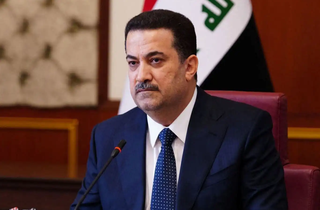The letter accused pro-Iranian militias operating within Iraq of launching strikes against Israel, a claim that al-Sudani firmly rejected. He labeled the message a “pretext for aggression” and criticized Israel for seeking to expand the ongoing conflict in the region.
In his statement, al-Sudani emphasized that decisions regarding war and peace rest solely with the Iraqi state. He reaffirmed Iraq’s commitment to staying out of regional conflicts while focusing on providing humanitarian aid to Palestinians and Lebanese civilians suffering from the ongoing violence in Gaza and Lebanon.
The Israeli letter urged the UN Security Council to hold Iraq accountable, arguing that its territory was being used as a base for attacks against Israel. Sa’ar warned that Israel reserves the right to self-defense, particularly in light of its military operations in Gaza and Lebanon.
In response, Iraq’s National Security Ministerial Council convened an emergency meeting to address the escalating tensions. The council dismissed the accusations as baseless and described them as part of a broader strategy to justify aggression against Iraq. Officials highlighted Iraq’s ongoing efforts to confiscate unauthorized weaponry and reiterated the state’s commitment to preventing its territory from being used for attacks.
To bolster Iraq’s readiness in the face of potential threats, al-Sudani directed military and security forces to take several measures. These included strengthening border security along Iraq’s western frontier with Syria, enhancing air defense systems to protect critical infrastructure, and cracking down on unauthorized military activities.
On the diplomatic front, al-Sudani tasked the Ministry of Foreign Affairs with engaging the Arab League to adopt a unified stance against Israeli threats. The ministry was also instructed to push the UN Security Council to review Iraq’s complaints about repeated Israeli violations of its airspace.
The situation in Iraq unfolds against the backdrop of heightened regional tensions. Iran-backed groups in Iraq have reportedly launched drone strikes against Israel, which they claim are retaliatory actions in response to Israel’s military operations in Gaza and Lebanon. The conflict in Gaza, triggered by Hamas’s cross-border attack last year, has caused nearly 44,000 deaths, primarily among women and children, according to Palestinian health authorities.
In Lebanon, hostilities have escalated further, with Israeli strikes targeting Hezbollah amid growing violence in the region. These developments underscore the fragile geopolitical landscape in the Middle East, where long-standing tensions continue to fuel instability.
Al-Sudani’s proactive measures reflect Iraq’s determination to safeguard its sovereignty while navigating the complexities of a volatile region. His warnings about potential aggression highlight the precarious position Iraq faces, striving to maintain neutrality amid an ever-widening conflict. (ILKHA)



 Güncel
Güncel
 Dünya
Dünya
 Güncel
Güncel
 Güncel
Güncel
 Güncel
Güncel
 Dünya
Dünya
 Dünya
Dünya
 Dünya
Dünya
 Güncel
Güncel
 Güncel
Güncel





